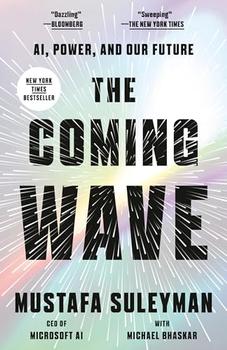Summary | Excerpt | Reviews | Beyond the Book | Read-Alikes | Genres & Themes | Author Bio

Technology, Power, and the Twenty-first Century's Greatest Dilemma
by Mustafa SuleymanThis article relates to The Coming Wave
 Artificial intelligence grabbed the headlines in November 2022 when OpenAI introduced ChatGPT to the world (GPT stands for generative pre-trained transformer). A large language model (LLM) designed to interact informally with a human interlocutor, ChatGPT has since released three more generations on the foundation model, with GPT-4's release in March 2023 marking its most impressive advances yet. "With broad general knowledge and domain expertise, GPT-4 can follow complex instructions in natural language and solve difficult problems with accuracy," according to OpenAI.
Artificial intelligence grabbed the headlines in November 2022 when OpenAI introduced ChatGPT to the world (GPT stands for generative pre-trained transformer). A large language model (LLM) designed to interact informally with a human interlocutor, ChatGPT has since released three more generations on the foundation model, with GPT-4's release in March 2023 marking its most impressive advances yet. "With broad general knowledge and domain expertise, GPT-4 can follow complex instructions in natural language and solve difficult problems with accuracy," according to OpenAI.
ChatGPT-4's capabilities are truly staggering. Now able to work with images, audio and code, this tool can compose poetry, create business plans, suggest compounds for novel drugs, build smartphone apps and create 3D computer programs for desktop browsers, just to name a few applications. Almost immediately, people and businesses were putting GPT-4 to use, as Mustafa Suleyman points out in The Coming Wave: "within days of its release people had built tools that automated lawsuits, helped co-parent children, and offered real-time fashion advice."
Sounds great on the surface, right? Maybe not so much. According to a recent article on Sifted, those tasked with stress testing the AI behind GPT-4 warn that the risks of the LLM responding with harmful or offensive information are "massive." Since GPT-4's rollout in early 2023, OpenAI has worked to mitigate these flaws. To do so, they created a "red team" (a cybersecurity term for those entrusted with sniffing out issues or vulnerabilities) and hired professionals with expertise in fields like chemistry and law to "stop ChatGPT giving bad legal advice or instructions on how to build a chemical weapon," for example.
But the complaints are already being logged. In July 2023, the Federal Trade Commission (FTC) received a complaint about GPT-4 from the Center for Artificial Intelligence and Digital Policy (CAIDP), a nonprofit organization devoted to the ethical advancement of AI. A Medium analysis of the CAIDP complaint cites "the ability of GPT-4 to produce negative content, such as hate speech, violence, and misinformation, poses a serious risk to public safety. The use of GPT-4 to create racist and sexist manifestos, phony news articles about terrorist events, and school shooting scripts have all been described as disturbing examples." The irony? That Medium article was itself "empowered by cutting-edge AI technology."
Although ChatGPT can make people's lives easier, it can also do a lot of harm. Even the CEO of OpenAI, Sam Altman, admits "we are a little bit scared of this" in an article in The Guardian shortly after the fourth generation's launch. Released only four months after the original foundation model in November 2022, GPT-4 became the fastest-growing consumer application in history. Worried about the misuses GPT-4 can be put to, such as large disinformation campaigns, Altman echoes Suleyman's call for both regulators and society to be involved with the technology to "guard against potentially negative consequences for humanity."
The positive aspect in all of this (worth remembering when people start to fear technology and machines "replacing" humans) is human agency itself. As Altman says of his own creation, "AI only works under direction, or input, from humans." True enough … for now.
ChatGPT logo, courtesy of logowik
Filed under Medicine, Science and Tech
![]() This "beyond the book article" relates to The Coming Wave. It originally ran in November 2023 and has been updated for the
April 2025 paperback edition.
Go to magazine.
This "beyond the book article" relates to The Coming Wave. It originally ran in November 2023 and has been updated for the
April 2025 paperback edition.
Go to magazine.
Your guide toexceptional books
BookBrowse seeks out and recommends the best in contemporary fiction and nonfiction—books that not only engage and entertain but also deepen our understanding of ourselves and the world around us.